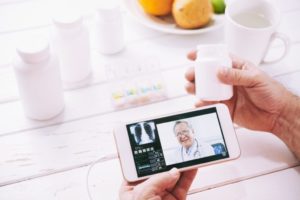How millennials are driving a healthcare revolution
 Facing pressure from an ageing population and the recent coronavirus (COVID-19) outbreak, the healthcare landscape is, as it always does, adapting to change. The knowledge and skills of tech-savvy millennials, who have grown up alongside the rise of the smartphone, social media and almost any service being available online, fuels the growing HealthTech sector, predicted to be worth more than $500 billion globally in 2020.
Facing pressure from an ageing population and the recent coronavirus (COVID-19) outbreak, the healthcare landscape is, as it always does, adapting to change. The knowledge and skills of tech-savvy millennials, who have grown up alongside the rise of the smartphone, social media and almost any service being available online, fuels the growing HealthTech sector, predicted to be worth more than $500 billion globally in 2020.
But millennials are also influencing the healthcare landscape in subtler, but crucial ways – particularly in this current climate where face-to-face appointments may put both NHS staff and patients at risk.
The rise of technological innovation in health, and the massive global investment it attracts, is no surprise. Technology and the internet now permeate, influence and improve almost every part of our lives; so why should it not revolutionise our health?
In the UK alone, the HealthTech sector boasts a combined turnover of £24 billion, and is now the “largest employer in the broader Life Sciences industry”, employing “127,400 people in 3,860 companies”.1 This includes tech start-ups that offer video consultations with a GP over a smart phone or computer.
What is HealthTech?
Currently, there is some disagreement over which solutions fall under the health technology ‘umbrella’ and which might be more appropriately classified under medical technology (MedTech). However, health technology – or digital health – is defined by the World Health Organisation (WHO) as “the application of organized knowledge and skills in the form of devices, medicines, vaccines, procedures and systems developed to solve a health problem and improve quality of lives”.2
By this definition, the sector compromises a wide range of innovative solutions including telehealth, apps, health analytics, wearables, diagnostic tools, and the use of artificial intelligence (AI) in drug discovery and medical equipment. While the sector as a whole seems primarily driven by the possibility – and current need – to improve quality of life and delivery of care for people with serious and/or long-term health conditions, its other focus is on creating solutions that offer flexibility, convenience and easier methods of communication between patients and healthcare professionals.
Improving patients’ quality of life has been a constant goal in the development of the healthcare sector, but it could be argued that the latter goals are millennial ones.
It’s a lifestyle, baby (boomers)
The typical millennial lifestyle is busy and chaotic. For example, 73% of millennials work more than 40 hours a week and 26% of the global millennial population work two or more paid jobs.3 Add in the pressures of commuting for work and juggling childcare into the mix, and the difficulty for some of the millennial generation in organising and attending medical appointments becomes clear.
Telehealth, video GP consultations and apps arose from the modern need to save time, coupled with the ever-increasing number of smartphone users. Globally, the number of smartphone users was predicted to reach 2.87 billion by 2020 and the UK had the highest smartphone-to-person ratio, with 82.2% of the population owning one in 2019.4 It has been essential for the healthcare sector to respond to the demand for convenience and to engage patients on their preferred platform, with statistics showing that 60% of millennials would choose a telehealth visit over an in-person one.5
The plethora of available health apps is no coincidence in the modern age – 1/5 or 20% of millennials open an app at least 50 times a day.6 The aim behind many of these apps, which include those for specific conditions such as diabetes and depression, is not simply to be a digital diary, but to help patients manage their health and well-being more effectively in their everyday lives. The popularity of health apps may be due to the growing trend of millennials seeing themselves as responsible for their own care.7
While digital solutions such as video GP consultations and online symptom checkers may have been created to fulfil the demand for greater convenience, they also have the potential to save lives.
Currently, a number of HealthTech suppliers are supporting the NHS in its response to the coronavirus (Covid-19) outbreak, ensuring patients receive the care they need while limiting the risk of the spread of the virus.
Wearable technology also has the potential to massively improve patients’ quality of life, and even save lives. Devices such as Path Finder – designed to help patients with Parkinson’s to walk more easily – is giving patients greater freedom and has the potential to reduce the risk of falls and trips.
However, it’s the rise of AI that is having the greatest impact on healthcare.
Driving innovation on a grand scale
Currently, AI has been used to help radiologists to detect breast cancer and to create a new medicine to treat patients with obsessive compulsive disorder (OCD).
But this relatively new technology is developing rapidly. Experts predict that, in future, AI will “propel healthcare towards predictive analysis and personalised medicine” and may catch diseases or medical events before they can develop.8 With the UK government putting £250 million forward to establish an AI lab for the NHS and NHSX (the department responsible for moving forward digital transformation) to improve diagnostics.
It’s an exciting time of change and disruption in healthcare. Who knows what the future will bring?
Additional references:
- https://www.techworld.com/picture-gallery/startups/uk-healthtech-startups-watch-3653416/
- https://www.who.int/health-technology-assessment/about/healthtechnology/en/
- https://www.parkcom.co.uk/millennials-rule-workforce-2020/
- https://quoracreative.com/article/mobile-marketing-statistics
- https://www.forbes.com/sites/joeharpaz/2019/08/26/6-expectations-millennials-healthcare/#2a3c222f30ec
- https://quoracreative.com/article/mobile-marketing-statistics
- https://www.forbes.com/sites/joeharpaz/2019/08/26/6-expectations-millennials-healthcare/#13d494e730ec
- https://www.disruptordaily.com/future-of-ai-healthcare/

By Dean Enon
PR Director








